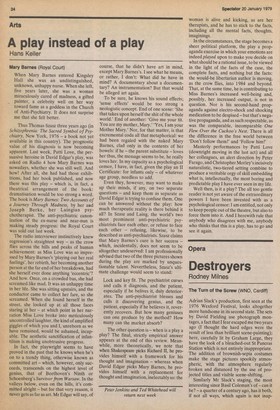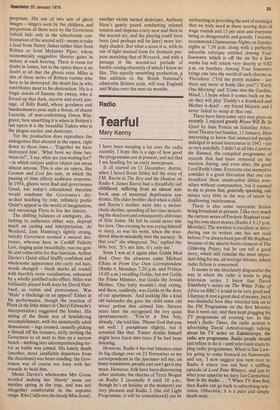Opera
Destroyers
Rodney MIlnes
The Turn of the Screw (WNO, Cardiff) Adrian Slack's production, first seen at the 1976 Wexford Festival, looks altogether more handsome in its second state. The sets by David Fielding use photograph montages, a fact that I fear escaped me two years ago (I thought the hard edges were the result of less than brilliant scene-painting); here, carefully lit by Graham Large, they have the look of a bleached-out St Pancras Station which is not entirely inappropriate. The addition of brownish-sepia costumes make the stage pictures spookily atmospheric, with the atmosphere regularly broken and distanced by the use of projected titles and visible scene-shifting.
Similarly Mr Slack's staging, the most interesting since Basil Coleman's of—can it be? — a quarter of a century ago, has it both, if not all ways, which again is not map propriate. His use of two sets of ghost images — singers seen by the children, and projections of them seen by the Governess (which fails only in the schoolroom confrontation of the second act) — seems to take a lead from Henry James rather than from Britten or from Myfanwy Piper, whose economically suggestive libretto gains in stature at each hearing. There is room for doubt in James, but in the opera there is no doubt at all that the ghosts exist. Miles is one of those series of Britten victims who have to be destroyed: the doubt lies in who contributes most to his destruction. He is a tragic cousin of Sammy the sweep, who is forced up that dark, narrow and sooty passage, of Billy Budd, whose goodness and handsomeness pose such a threat, of chaste Lucretia, of non-conforming Owen Wingrave; how unsettling it is when in Britten's last opera it is the beautiful Tadzio who is the plague-carrier and destroyer.
Yet the production does reproduce the ambiguities that abound in the opera, right down to those lines — 'Together we have destroyed him', 'What have we done between us?', 'I say, what are you waiting for?'
— in which subject and/or object can mean almost anyone. This is also an opera, like Carmen and Cosi fan tutte, in which the passing of time effects audience response.
In 1954, ghosts were Bad and governesses Good, but today's educational theorists would condemn the Governess's dryas-dust teaching by rote, infinitely prefer Quint's appeal to the world of imagination, and encourage Flora to live her history.
The shifting balances of ambiguity, disturbing to audiences either way, depend much on casting and interpretation. At Wexford, Jane Manning's tightly strung, twitchy Governess seemed a natural des troyer, whereas here in Cardiff Felicity Lott, singing quite beautifully, was too gentle and vulnerable for that function. Arthur Davies's Quint allied bluffly confident and wholesome appearance (no curly red hair, words changed — black marks all round) with horribly eerie vocalization, enhanced by a wholly justified echo effect. Miles was brilliantly played both ways by David Hub bard, as victim and provocateur. Was 'Maio' a challenge or an appeal? Either in his performance, though the reaction of Flora (a sly little mixer in Cheryl Edwards's interpretation) suggested the former. His acting of the finale was of bewildering accomplishment, with his unnaturally adult demeanour — legs crossed, casually picking a thread off his trousers, airily inviting the Governess to sit next to him on a narrow bench — melting into uncomprehending terror as battle was joined. His lonely death (another, more justifiable departure from the directions) was heart-rending: the Governess was of course too busy with her crusade to hold him.
Menai Davies's wholesome Mrs Grose avoided making her 'liberty' seem yet another spring in the trap, and was not altogether comfortable in the soprano range. Rita Cullis was the beady Miss Jessel, another victim turned destroyer. Anthony Hose's gently paced conducting relaxed tension and impetus every now and then in the second act, and the playing could have been (and perhaps will be later) more lovingly shaded. But what a score it is, with its use of tight musical form for dramatic purpose matching that of Wozzeck, and with a passage in the second-act prelude of hackle-raising obscenity of which I know no like. This equally unsettling production, fine addition to the Welsh National's admirable Britten cycle, will tour England and Wales over the next six months.



































 Previous page
Previous page